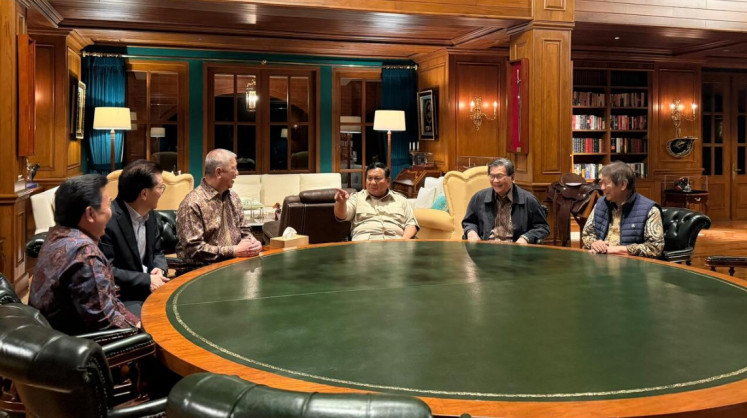Popular Reads
Top Results
Can't find what you're looking for?
View all search resultsPopular Reads
Top Results
Can't find what you're looking for?
View all search resultsBandung Principles, world order and the imperative for change (part 1)
The historic Asia-Africa Conference symbolized Asia’s resurgence, the promise of full liberation of Africa and strategic solidarity between two regions representing over half of the world’s population.
Change text size
Gift Premium Articles
to Anyone

The historic Asia-Africa Conference hosted by Indonesia in April 1955 was a landmark event and an unprecedented meeting of top leaders representing an array of emerging nations in the post-colonial world.
It was also a rare meeting of minds between two great continents, Asia and Africa. Bandung symbolized Asia’s resurgence, the promise of full liberation of Africa and strategic solidarity between two regions representing over half of the world’s population.
It heralded the birth and development of the Non-Aligned Movement (NAM) and laid the foundations of South-South cooperation. The Bandung Principles have retained their relevance seven decades after the conference ended.
By reminding ourselves, and especially the younger generation of Asians and Africans around the world, CSIS Indonesia, has rendered yeoman service. Our mission today is to reflect upon and explain the historical significance and continuing relevance of the Dasasila, the Ten Principles of Bandung, to this decade and the 21st century.
We undertake this stimulating and purposeful exercise at a specially challenging moment. We are living through the “Turbulent Twenties” of the present century, a period of the polycrisis encompassing the COVID-19 pandemic, the Ukraine war, the multiple conflicts in West Asia and now the change of administration in the United States. The last development has triggered multiple changes at the global level. And the story has just begun!
India’s External Affairs Minister S. Jaishankar has aptly described the present situation as “a churn.” Former foreign secretary and ambassador to Indonesia Shyam Saran stated that it is now a “topsy-turvy world” in which the challenge is to navigate one’s way “in an unstable and shifting geopolitical terrain where familiar landmarks and reassuring anchors vanish with bewildering rapidity.”
A former South Korean foreign minister and the president of the Asia Society said the recent developments represent “a paradigm shift.” Scholars are busy unpacking various dimensions of the phenomenon called “the Trump effect,” with many suggesting that Trumpism could well outlast President Donald Trump’s second term.
Those of us studying the internal policy changes in the US are fascinated by their depth and magnitude. Still, here we are more concerned about the range of changes related to the international scene caused by the US’ fundamentally novel approach to foreign relations. In my assessment, at least eight significant trends may be identified, although these are still early days.
First, there is the striking US withdrawal from multilateral institutions such as the World Health Organization (WHO), the Paris Agreement on climate change, the adoption of a tough attitude toward the United Nations, the erosion of the World Trade Organization (WTO)-anchored system and general negativity or neglect toward BRICS and the Group of 20 (G20).
Second, heightened territorial interests, dubbed by some in the media as “the return of the Empire”, as seen on issues such as the threat to take back the Panama Canal, renaming of the Gulf of Mexico, viewing Canada as “the 51st state”, the plan to acquire Greenland “one way or another” and the scheme to turn Gaza into "the Middle East’s Riviera."
Third, a new complex US message given to Europe that it must become self-reliant for security, “stop fleecing us" and opt for peace as other, more pressing challenges face the world. Objectively speaking, Europe’s self-absorption since COVID and particularly Ukraine, is likely to grow significantly. This has implications for the developing world.
Fourth, the signal to Ukraine and Russia is unmistakable: stop the war on terms set through the US mediation, which includes major concessions by Ukraine on territory and admission to NATO, as well as some climbdown by Russia.
Fifth, lines have been drawn clearly in West Asia: the US supports and covers Israel, views Iran as a major threat, and wishes to work with the Gulf States and others, such as India, on the IMEC project. The two-state solution is hardly mentioned these days.
Sixth, apparently, Washington’s China policy is in the process of evolution. The Asian giant is viewed as an economic threat and will be treated as such, but a resolution through negotiations remains a distinct possibility.
Yet, on the larger strategic implications in the Indo-Pacific, the US probably awaits a presidential visit to Beijing. Meanwhile, the administration seems less interested in other regions, such as Central Asia, South Asia, Southeast Asia and Africa.
Seventh, with President Trump's announcement of new tariffs on April 2 and subsequent fast-paced developments, many experts fear a trifecta of global trade war leading to disruption in the supply chains, inflation and recession.
As Singapore Prime Minister Lawrence Wong said, the world now witnesses “seismic change in the global order.” The era of free trade and globalization is over. “We are entering a new phase, one that is more arbitrary, protectionist and dangerous.”
Finally, with Group of Seven (G7) unity in tatters and the Atlantic Alliance coming under considerable stress, the quotient of multipolarity has increased considerably. This also imparts a new momentum to regionalism and the impulse to strengthen regional institutions ranging from the European Union to ASEAN and BIMSTEC. “All geopolitics is regional now,” wrote an eminent Indian scholar recently.
The sum and substance of it all is this: the old order is giving way, but the contours of the new order are still unclear.
---
Rajiv Bhatia is a distinguished fellow at the Foreign Studies Programme, Gateway House and a former Indian ambassador. This article is taken from his keynote speech at a CSIS seminar on April 16, themed “The Global South in a Shifting World Order: Challenges, Aspirations and the Road Ahead”. This is the first part of a two-part article.











